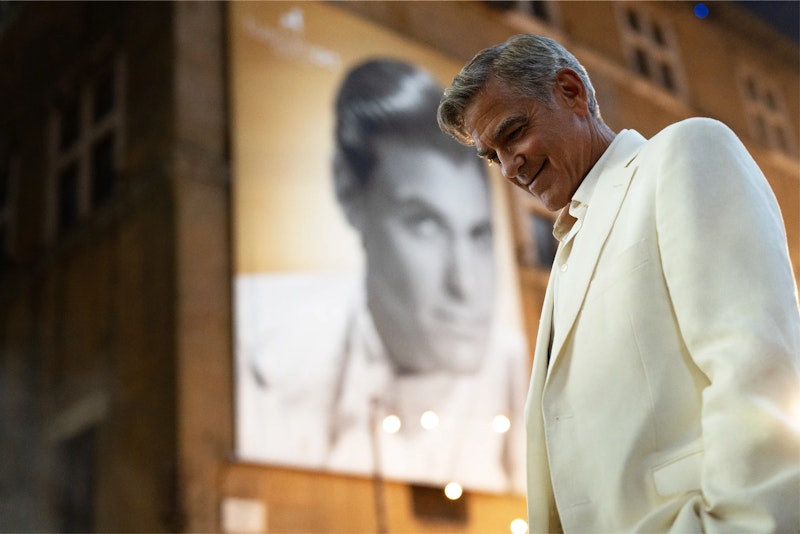George Clooney’s career is largely defined by a response to failure. Clooney was initially considered to be one of the many “television stars” who couldn’t make it in film after his disastrous performance as Bruce Wayne in Joel Schumacher’s ill-fated comic book sequel Batman & Robin, and it took a series of collaborations with Steven Soderbergh and the Coen brothers to prove he could really act. Clooney’s best roles have been hapless idiots (O Brother, Where Art Thou?), charismatic loners (Up in the Air), depressed elder statesman (The Descendants), and smug anti-heroes (Out of Sight); anything too clean has made him look unreasonably comfortable with his own success.
Despite his recent splash on Broadway with the adaptation of Good Night and Good Luck (based on a film that he directed), Clooney’s past decade has included box office disappointments like Tomorrowland, Ticket to Paradise, and Money Monster. It hasn’t helped that his directorial career has been largely underwhelming; who would’ve guessed that a star known for being likeable would have such dull creative instincts? The ups and downs of Clooney’s career positioned him well to be the subject of an exhaustive, often unflattering work of self-analysis like Jay Kelly. Of the many cutting lines within Noah Baumbach’s script, the most affecting is the remark “Do you know how hard it is to be yourself?”
Works of Hollywood meta-fiction aren’t uncommon, with recent examples humanistic (Pedro Almodovar’s Pain and Glory) or curiously artistic (Birdman). Baumbach has never represented mainstream prestige, even within independent circles. Baumbach’s brand of arch dramedies is too cynical to be seen as cozy, yet too goofy to be mistaken for grounded realism. It’s this history that’s made the sincerity of Jay Kelly authentic, because being open-hearted has taken Baumbach outside his familiar work. It’s easy to dismiss Jay Kelly as a saccharine weepie that asks its viewers to have sympathy for a rich and successful movie star, and Baumbach is aware of the fact.
Clooney is given the titular role in Jay Kelly, who’s an aging movie star prepared to receive a career tribute at a prestigious film festival in Europe. Although Jay has never experienced the sort of backlash or fallow period that would affect his legacy, his consistent fame has worn on his personal relationships. Both of Jay’s daughters, Jessica (Riley Keough) and Daisy (Grace Edwards), are distant; Jessica hasn’t seen him in years, and Daisy has buried his advice as she makes her post-high school career decisions. Jay’s used to dying onscreen, but this particular intersection between professional acclaim and personal turmoil has resulted in a full-blown breakdown.
In Baumbach’s imagination, being a parent, public figure, industry spokesman, or friend has required acting, and Jay’s skills as a performer have made it hard for him to be taken seriously. He doesn’t have an excuse to be unhappy, especially when so many of his frequent collaborators have seen their careers fall to the wayside. The open dialogue with the notion of stardom is realized in a fascinating way, with several artful sequences that involve Jay inserted into reflections on his past. Even if these dream sequences are laced with a tinge of schmaltz, they fit within the contorted perspective of a character like Jay, who’s forced to admit “all my memories are movies” when asked about his personal regrets.
Jay Kelly has a robust ensemble cast, and Baumbach has resisted any urge to insert obvious stand-ins for figures in Clooney’s own career. The most hyped has been a dramatic turn by Adam Sandler as Ron Sukenick, Jay’s manager, who’s sacrificed much of his own well-being to appease his most high-profile client. Ron’s been so dependent on Jay as an employer that it’s only just dawned on him that a legitimate “friend” wouldn’t ask him to give up personal time off for the sake of impromptu trips or instinctual career decisions, and the plasticity of their relationship is where Jay Kelly is at its most ambiguous. Sandler is best when he’s cast as a well-meaning good guy caught in over his head, but Baumbach has had the wisdom to place him in a supporting role.
The most significant supporting character in Jay Kelly is Jay’s former acting school buddy, Timothy, who’s played by Billy Crudup in a few scenes. Timothy has respected the A-list instincts of his friend, but his opinion of Jay has soured after years of being surpassed. The conflict between Timothy and Jay is interesting because of Baumbach’s ability to make it mutually acidic. Timothy’s initially sympathetic notion that he’s “the guy who didn’t make it” is rendered tiresome by his complaining, even if Jay’s assertion he simply didn’t have the talent is too harsh.

